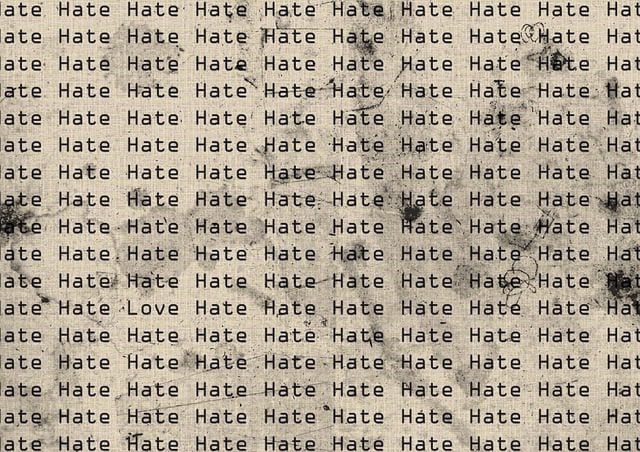
If Penal Substitutionary Atonement Theory is true, then we need to re-write John chapter 3, verse 16 to say:
“For God was so filled with wrath against the world, that he sent his only begotten son to take the beating that we all deserved. That if anyone would want to escape eternal suffering, and would raise their hand and repeat this prayer after me, they would escape this horrible wrath. For the son was not sent into the world to change our minds about God, but to change God’s mind about us. So now that Jesus has taken the punishment for us, God can now finally love us, and forgive us.”
But…there’s nothing at all like this in the New Testament. Not even close.
In fact, as I’ve already mentioned in a previous blog, John 3:16 doesn’t even mention the crucifixion at all. It only mentions God’s love for the entire planet, and God’s desire that we put our trust in Christ and not die, but have life.
That’s a bit more like it, I think.
What’s more, the idea that God requires the shedding of blood to forgive our sins is not only false, it’s clearly demonstrated to be unnecessary as Jesus forgives sins numerous times in the Gospels – pre-crucifixion – and even empowers us to do so.
For example, check out this exchange in Matthew 9:
[Jesus says] “But I want you to know that the Son of Man has authority on earth to forgive sins.” So he said to the paralyzed man, “Get up, take your mat and go home.” Then the man got up and went home. When the crowd saw this, they were filled with awe; and they praised God, who had given such authority to man.” [v. 6-9]
Did you catch it? First, Jesus says that he [the Son of Man] “has authority on earth to forgive sins” and to prove it, Jesus heals the man. Then, the crowds “were filled with awe and praised God” – why? – because “God…had given such authority to man.”
Had given WHAT authority to man? The authority on earth to forgive sins.
Notice Jesus diddly about the shedding of blood needing to come first.
Also, when Jesus is in the act of being crucified – but still very much alive – he asks the Father to forgive them in advance for what they have done – and are about to do – to him. All without actually being crucified, shedding blood on the cross, or dying for anyone’s sins.
The idea that God requires blood and the sacrifice of an innocent victim before God can love, forgive or accept us is archaic, and pre-Christian. It’s an idea that was formulated by ancient people who had barely emerged from idol-worshipping cultures where the gods were seen as fickle and angry and that this anger could only be assuaged by the sacrifice of an innocent animal or sometimes a human being.
This is what natives and islanders believed thousands of years ago. We would call those people primitive and perhaps even scoff at their foolish ideas about appeasing an angry god by killing someone, or something.
But, Christians seem to have no trouble believing that the God of the Bible is exactly the same.
In spite of the fact that Jesus said no such thing, and even demonstrated the exact opposite: God is love. God’s love for us is endless. God is the Good Father who patiently waits for his children to return to him and rushes out to meet them, and kiss them, and place a robe around their shoulders and a ring upon their fingers and to throw a huge party – without first requiring us to grovel, or beg, or even to pay him back what we stole, or requiring the torture or death of any living thing in advance.
God just forgives. It’s how God responds to sin: Forgiveness.
It’s how God responds to us: Love. Just total and complete, inexplicable love.
Why? Because God is love. It’s just who God is.
Reading the Scriptures through the lens of Christ allows us to see a God who does not count our sins against us. It allows us to see – in Christ – a God who would rather die than live without us, and who would rather suffer the violence we bring against him than to retaliate against us.
Penal Substitutionary Atonement theory is just that: a theory. It’s also, I believe, a pretty bad one; one that does not square with the character of Christ – who is the incarnation of God and the exact representation of His being; the one in whom the fullness of God lives in bodily form. [See John 1:1; Heb. 1:3; Col. 2:9]
Now, I realize that I’ve left a lot of questions unanswered here. What about those verses that suggest that Jesus died for our sins? What does that mean? Well, the short answer would be that “dying for our sins” may not mean what we’ve always been told it is supposed to mean. Maybe it means that Jesus died “because of our sins”, meaning that we, in our sinfulness, killed Jesus and in this way he “died [due to] our sins.”
I think N.T. Wright’s latest book “The Day the Revolution Began” does an excellent job of unpacking this question. Much better than I could do here [or have done].
Another question might be: What about the verses in the New Testament [Hebrews for example] that repeat the pre-Christian notion that “without the shedding of blood there is no remission of sins”?
Again, the answer to that is quite long and would require an entirely new post. But, in short, I’d say that those verses [especially the one in Hebrews] are used to compare/contrast the Old Covenant with the New Covenant and to point out how Jesus transcends and supersedes those archaic ways of thinking and acting. The overall point is often how Jesus has now put an end to those old ways and abolished those old practices, once and for all. His blood has been shed – by us, no less – and now God’s forgiveness is finally, ultimately, and forever poured out over all mankind; from here to eternity.
So, where was God when Jesus was being crucified? Is God the one holding the hammer? Is God the one pouring out His wrath upon the Son? Not at all. “God was,” as Paul so beautifully reminds us, “in Christ, reconciling the world to Himself; not counting men’s sins against them.” [See 2 Cor. 5:19]
What’s more, the “wrath of God” is a loaded phrase that too many Bible teachers have watered down to mean “God’s wrath against us” rather than an apocalyptic hyperbole that is always a metaphor for reaping what you have sown and most often revealed when an invading army surrounds your city or defeats you in battle, or takes you and your family as captives.
In short, there’s a lot more to the Atonement than meets the eye. It’s good to consider some of those other 7 theories of the Atonement that have been around much longer than Calvin’s “Penal Substitution” (PSA) which didn’t exist until the 16th century.
What proponents of PSA often fail to recognize is that most of the 7 major atonement theories that have popped up over the last 2,000 years were in response to the dominant theory of the day. So, Moral Influence Theory wouldn’t exist without Ransom Theory, and Christus Victor modifies them both, and Satisfaction Theory wouldn’t exist if Anselm weren’t trying to update and refine Ransom Theory, and Calvin would never have formulated Penal Substitution without the framework of all that had gone before.
PSA is not the Gospel. It’s a theory. The Gospel? That’s what Jesus says it is. He tells us all about it in the Gospels – you know, the Gospels of Matthew, Mark, Luke and John. It’s very simply the “Good News” [or Gospel] of the Kingdom of God. It’s what Jesus preached. It’s what Paul preached. It’s the only Gospel there ever was, or ever will be.
Please, don’t take my word for it. Read the Gospels for yourself. Listen to Jesus. Don’t just call Him ‘Lord, lord’, but please, do what Jesus says.
You’ll be glad you did.
NOTE: If you’d like to listen to a debate I did this week with my friend on this topic, it’s available HERE.
**
Keith Giles was formerly a licensed and ordained minister who walked away from organized church 11 years ago, to start a home fellowship that gave away 100% of the offering to the poor in the community.
His new book “Jesus Unbound: Liberating the Word of God from the Bible”, is available now on Amazon and features a Foreword by author Brian Zahnd.
He is also the author of the Amazon best-seller, “Jesus Untangled: Crucifying Our Politics To Pledge Allegiance To The Lamb” with a Foreword by Greg Boyd.
Keith also co-hosts the Heretic Happy Hour Podcast on iTunes and Podbean. He and his wife live in Meridian, Idaho, awaiting their next adventure.
BONUS: Want to unlock exclusive content including blog articles, short stories, music, podcasts, videos and more? Visit my Patreon page.













